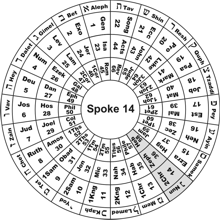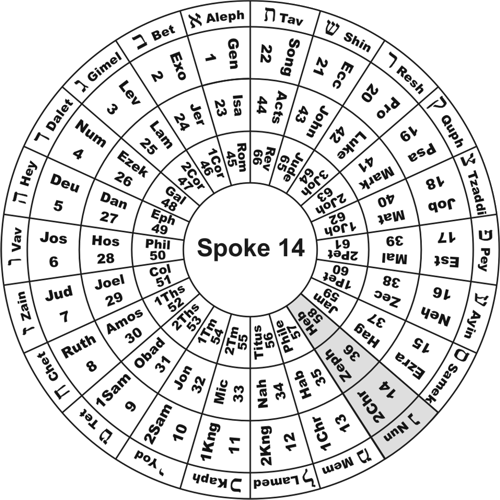A Priest Forever after the Order of Melchizedek
Wherein God, willing more abundantly to shew unto the heirs of promise
the immutability of his counsel, confirmed it by an OATH: That by two
immutable things, in which it
was impossible for God to lie, we might have a strong consolation, who have fled for refuge to
lay hold upon the hope set before us: Which hope we have as an anchor of the soul,
both sure and stedfast,
and which entereth into that within the veil; Whither the forerunner is for us entered, even Jesus,
made an high priest forever after the order of Melchizedek.
Hebrews 6:17ff (Spoke 14, Cycle 3)
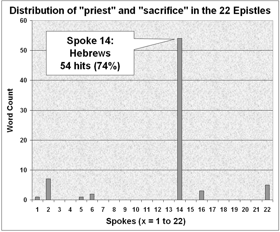 This
passage brings the integration of Hebrews with the priestly theme of 2 Chronicles into full view.
Its entire seventh chapter contrasts and compares the Levitical Priesthood with the eternal Priesthood of Jesus Christ.
The words priest, Levite, or Levitical occur eighteen times in just that one chapter. Likewise, the book
itself contains the vast majority of all references to priests and sacrifice found in the
Twenty-Two Epistles,
as shown in the graph. Furthermore, the whole basis of Christ's Priesthood rests on the oath God swore,
saying "The Lord hath sworn (nishba), and will not repent, Thou art a priest for ever after the order
of Melchizedek" (Ps 110:4). The word God used in this Oath is a primary Nun KeyWord that He placed with perfect
precision in AV Psalm 119:106: This
passage brings the integration of Hebrews with the priestly theme of 2 Chronicles into full view.
Its entire seventh chapter contrasts and compares the Levitical Priesthood with the eternal Priesthood of Jesus Christ.
The words priest, Levite, or Levitical occur eighteen times in just that one chapter. Likewise, the book
itself contains the vast majority of all references to priests and sacrifice found in the
Twenty-Two Epistles,
as shown in the graph. Furthermore, the whole basis of Christ's Priesthood rests on the oath God swore,
saying "The Lord hath sworn (nishba), and will not repent, Thou art a priest for ever after the order
of Melchizedek" (Ps 110:4). The word God used in this Oath is a primary Nun KeyWord that He placed with perfect
precision in AV Psalm 119:106:
- AV Psalm 119:106 I have sworn (nishbati), and I will perform it, that I will keep thy righteous judgments.
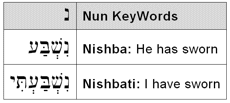 These two KeyWords are almost identical. They are a grammatical conjugation of the
Shin KeyWord shava (to swear, BW book pg 208) called the niphil perfect. Their only difference
is that one is in the first person and the other is in the third. This is a powerful link from a Nun Alphabetic
Verse to the primary theme of Hebrews. It is profoundly intertwined with the meaning of Nun as the
symbol of continuance, faithfulness, immutability, and eternality. Look again at the expressions in the
verse quoted at the head of this section; heirs of promise, immutable, confirmed, anchor of the soul,
sure and steadfast, forever. And all those are just from one passage! This is the dominant vocabulary of
Hebrews, as seen with complete clarity here in this list of characteristic words found in it (repeat occurrences in parentheses):
These two KeyWords are almost identical. They are a grammatical conjugation of the
Shin KeyWord shava (to swear, BW book pg 208) called the niphil perfect. Their only difference
is that one is in the first person and the other is in the third. This is a powerful link from a Nun Alphabetic
Verse to the primary theme of Hebrews. It is profoundly intertwined with the meaning of Nun as the
symbol of continuance, faithfulness, immutability, and eternality. Look again at the expressions in the
verse quoted at the head of this section; heirs of promise, immutable, confirmed, anchor of the soul,
sure and steadfast, forever. And all those are just from one passage! This is the dominant vocabulary of
Hebrews, as seen with complete clarity here in this list of characteristic words found in it (repeat occurrences in parentheses):
confidence (3x), confirmation, confirmed (2x), continually (3x), continue (2x),
continued, continueth, continuing, daily (3x), endure (2x), endured (5x), enduring, established, eternal (5x),
faith (32x), faithful (4x), for ever (9x), for evermore, foundation (4x), hold fast (3x), immutable, immutability,
often (2x), oftentimes, patience (3x), patiently, remain, remainest, remaineth (2x), rest (10x), stedfast (3x),
sure, surety, unchangeable
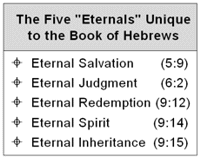 This list
contains over one hundred occurrences of words exemplifying the symbolic
meaning of the Fourteenth Letter as taught in Scripture and recognized for thousands of years in rabbinic tradition.
Just as we saw the meaning of Gimel exemplified by a large set of words associated with abundance in
2 Corinthians on Spoke 3 (BW book pg 163), so now we see exactly the same
phenomenon with regards to the meaning of Nun in Hebrews on Spoke 14. Yet there still is more.
All these ideas are amplified by the five "eternals" found nowhere in the Bible except the Book of Hebrews.
Three of them occur in a single context: This list
contains over one hundred occurrences of words exemplifying the symbolic
meaning of the Fourteenth Letter as taught in Scripture and recognized for thousands of years in rabbinic tradition.
Just as we saw the meaning of Gimel exemplified by a large set of words associated with abundance in
2 Corinthians on Spoke 3 (BW book pg 163), so now we see exactly the same
phenomenon with regards to the meaning of Nun in Hebrews on Spoke 14. Yet there still is more.
All these ideas are amplified by the five "eternals" found nowhere in the Bible except the Book of Hebrews.
Three of them occur in a single context:
But Christ being come an high priest of good things to come, by a greater
and more perfect tabernacle, not made with hands, that is to say, not of this building;
Neither by the blood of goats and calves, but by his own blood he entered in once into the holy place,
having obtained eternal redemption for us. For if the blood of bulls and of goats, and the ashes
of an heifer sprinkling the unclean, sanctifieth to the purifying of the flesh:
How much more shall the blood of Christ, who through the eternal Spirit offered himself without
spot to God, purge your conscience from dead works to serve the living God? And for this cause
he is the mediator of the new testament, that by means of death, for the redemption of the transgressions
that were under the first testament, they which are called might receive the promise of eternal inheritance.
Hebrews 9.11ff (Spoke 14, Cycle 3)
The last highlighted phrase, eternal inheritance, sums up the full meaning of Nun.
Hebrews explains its origin in Melchizedek, who appears in the OT History Books
only in Genesis 14. Here are a few of the primary verses
from the Book of Hebrews that explains the eternal nature of our High Priest after the order of Melchizedek:
- Hebrews 7:1ff For this Melchizedek, king of Salem, priest of the most high God, ...
Without father, without mother, without descent, having neither beginning of days, nor end of life; but made
like unto the Son of God; abideth a priest continually.
- Hebrews 7:15f And it is yet far more evident: for that after the similitude of Melchizedek there ariseth another priest,
Who is made ... after the power of an endless life. For he testifieth,
Thou art a priest forever after the order of Melchizedek.
- Hebrews 7:24 But this man, because he continueth ever, hath an unchangeable priesthood.
- Hebrews 8:1 Now of the things which we have spoken this is the sum: We have such an high priest, who
is set on the right hand of the throne of the Majesty in the heavens ...
- Hebrews 13:8 JESUS CHRIST THE SAME YESTERDAY, AND TODAY, AND FOREVER.
Next article: Jesus Christ: The Substance of our Faith
|
